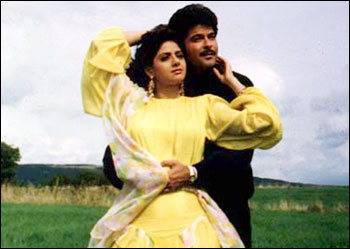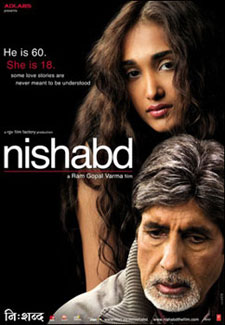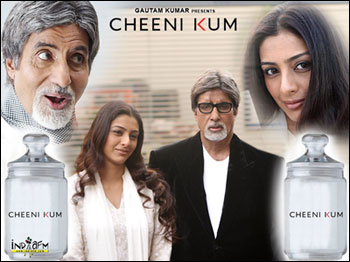 In 1991, actor Anil Kapoor had his hopes pinned on his upcoming release, Lamhe. Long before his Slumdog days, Anil had been an angry young actor who felt that his talent went unappreciated. Despite a plethora of hits (including Tezaab, Parinda and Mr India), he had never managed to win the much-coveted Best Actor award at Filmfare. Anil hoped that Lamhe would change that and give him the recognition he deserved. It had all the makings of a hit: the movie was directed by Yash Chopra, the music was extremely good, the cinematography stretched from the haunting deserts of Rajasthan to urban London. Anil was cast opposite Sri Devi, and they had already been established as a great on-screen couple. Yash Chopra hoped that if the movie was successful, Anil would even be able to make it to Hollywood. In 1991, actor Anil Kapoor had his hopes pinned on his upcoming release, Lamhe. Long before his Slumdog days, Anil had been an angry young actor who felt that his talent went unappreciated. Despite a plethora of hits (including Tezaab, Parinda and Mr India), he had never managed to win the much-coveted Best Actor award at Filmfare. Anil hoped that Lamhe would change that and give him the recognition he deserved. It had all the makings of a hit: the movie was directed by Yash Chopra, the music was extremely good, the cinematography stretched from the haunting deserts of Rajasthan to urban London. Anil was cast opposite Sri Devi, and they had already been established as a great on-screen couple. Yash Chopra hoped that if the movie was successful, Anil would even be able to make it to Hollywood.
Despite such high expectations, Lamhe flopped in India. The Indian audience just could not swallow a film in which an aged hero marries a girl less than half his age. Give the audience a raunchy rain dance or a lust-crazed villain and they'll accept it without blinking an eyelid, but a romance between a time-worn 40-year old and a young teenage girl just could not be fathomed. The very notion was quite repulsive!
18 years later, the Indian film industry has changed by leaps and bounds. Movies are executed with much more finesse and every movie worth its mettle boasts of scenic cinematography from some exotic locale. The storylines may not be as unique or original as they were in the past, but the censor boards have certainly gotten more liberal. The supposedly erotic rain dance of the yesteryears has been replaced by bold club dance sequences and a bikini-clad heroine is no longer a big deal.
Still, certain things remain the same. Audiences still refuse to accept unconventional stories. So, the occasional film on teenage pregnancy (Preity Zinta's Kya Kehna) is a box-office disaster, experimental movies on homosexuality (the forgettable Girlfriend) are met with aversion and an older man-younger woman romance still spells out the making of a flop.
 Nishabd: Amitabh Bachchan falls in love with a teenager… and it doesn't end well Nishabd: Amitabh Bachchan falls in love with a teenager… and it doesn't end well
Take director Ram Gopal Verma's 2007 box-office flop, Nishabd. The movie stars Amitabh Bachchan as a 60-year old octogenarian who falls in love with his daughter's 18-year old friend (Jiah Khan). Set in a picturesque hill station, the movie shows how Amitabh's character, Vijay, feels increasingly drawn to his daughter's friend who has come to visit for the holidays and parades around in skimpy outfits. The attraction between the two grows until they are caught out by Vijay's wife. Vijay throws the girl out of his house. Nevertheless, his family has been torn apart and he begins to contemplate suicide. Towards the end of the movie, he decides that he doesn't want to die - he'd rather spend the rest of his years living with the memory of Jiah. Directed with Verma's customary candor and with a sensitive, emotive performance by Amitabh Bachchan, the film flopped miserably.
Cheeni Kum: Amitabh Bachchan falls in love with Tabu…and it ends well!
Yet another May-November romance, starring Amitabh as a 60-something man romancing a 30-something Tabu was the cleverly comic Cheeni Kum. Bachchan plays Buddhadev, a  sardonic, egotistic chef working in a top London restaurant. Nina, played by Tabu, walks into the restaurant and complains about the food, sparking off an unconventional, albeit believable romance. The 30-year age difference does not bother either of the two but it certainly incites Nina's father (Paresh Rawal), who cannot accept that his daughter wants to marry a man who is six years older than her own father. Subsequently, Buddhadev sets off on winning the approval of his prospective father-in-law. The movie is witty, the acting exemplary and the older man-younger woman scenario is treated in a frothy, light-hearted manner, making the relationship between Buddhadev and Nina much more plausible. Cheeni Kum is one of the few Indian movies in which the older man and younger woman are not forced to 'see the light' and actually have a happy ending together. Nevertheless, it is probably this happy ending that resulted in this movie receiving an average response from the audience. sardonic, egotistic chef working in a top London restaurant. Nina, played by Tabu, walks into the restaurant and complains about the food, sparking off an unconventional, albeit believable romance. The 30-year age difference does not bother either of the two but it certainly incites Nina's father (Paresh Rawal), who cannot accept that his daughter wants to marry a man who is six years older than her own father. Subsequently, Buddhadev sets off on winning the approval of his prospective father-in-law. The movie is witty, the acting exemplary and the older man-younger woman scenario is treated in a frothy, light-hearted manner, making the relationship between Buddhadev and Nina much more plausible. Cheeni Kum is one of the few Indian movies in which the older man and younger woman are not forced to 'see the light' and actually have a happy ending together. Nevertheless, it is probably this happy ending that resulted in this movie receiving an average response from the audience.
Joggers' Park: Great music, but its still a flop
The insightful Joggers' Park, released in 2003, faded from public memory without a whimper. The movie stars Perizaad Zorabian as a model who meets a retired judge, played by Victor Bannerjee, in Mumbai's Joggers' Park. The two become friends and eventually fall in love. The romance meets an unhappy end - the model's friends find the relationship revolting and the judge has to give precedence to his familial obligations. Sensitively directed with melodious tracks by Adnan Sami and Jagjit Singh, the only reason why a movie as engrossing as Joggers' Park could (and did) fail was its bold subject.
How to make the age factor work: throw in a teary ending
If Indian audiences find it difficult to accept an older man-younger woman romance, even Indian filmmakers are unable to do justice to a love story between an older woman and younger man. A number of movies have been made on the theme, including Dimple Kapadia and Akshay Khanna in Dil Chahta Hai, Deepa Sahi and Shah Rukh Khan in Maya Memsaab and Raakhi and Rishi Kapoor in Doosra Aadmi. However in each story, the love affair has an unhappy ending and something 'has' to be wrong with the older woman to contemplate romancing a younger man. Dimple in Dil Chahta Hai was a depressed alcoholic, Deepa Sahi in Maya Memsaab was a unhappy, confused woman and Raakhi in Doosra Aadmi was a dejected woman frantically trying to hold on to the memories of her dead lover.
But many of these movies have won critical acclaim. Lamhe was a huge hit overseas and Joggers' Park and Cheeni Kum received favorable reviews. The fact remains that the Indian populace, which largely includes viewers who don't live in the metropolitan cities but in smaller towns and villages, don't welcome unconventional subjects. The success of the highly repetitive, innumerable 'saas-bahu' sagas on television just goes to show what audiences want is good old fashioned family values combined with drama. So if a filmmaker really does want to make a movie on a May-November romance, it is probably more financially viable to give the script a sad ending and to show one (or both) of the protagonists as nutcases. In 2004, when a young Priyanka Chopra starred in Aitraaz as the wife of an aging Amrish Puri, one of the characters in Aitraaz snidely commented that she looked like his granddaughter. The story proceeded to reveal Priyanka to be a conniving, psychotic, sexual harasser. The movie turned out to be a hit, of course! |

